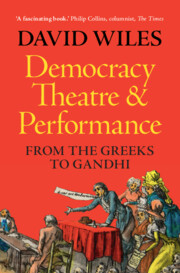Book contents
- Democracy, Theatre and Performance
- Democracy, Theatre and Performance
- Copyright page
- Contents
- Figures
- Acknowledgements
- Introduction
- Chapter 1 Rhetoric in Athens
- Chapter 2 Acting versus Sincerity
- Chapter 3 Puritan Democracy
- Chapter 4 Oratory in the French Revolution
- Chapter 5 American Democracy
- Chapter 6 Democracy as a Universal Good
- Chapter 7 Theatre and Theatrocracy in Democratic Athens
- Notes
- References
- Index
Chapter 2 - Acting versus Sincerity
Aeschines versus Demosthenes
Published online by Cambridge University Press: 17 May 2024
- Democracy, Theatre and Performance
- Democracy, Theatre and Performance
- Copyright page
- Contents
- Figures
- Acknowledgements
- Introduction
- Chapter 1 Rhetoric in Athens
- Chapter 2 Acting versus Sincerity
- Chapter 3 Puritan Democracy
- Chapter 4 Oratory in the French Revolution
- Chapter 5 American Democracy
- Chapter 6 Democracy as a Universal Good
- Chapter 7 Theatre and Theatrocracy in Democratic Athens
- Notes
- References
- Index
Summary
This chapter is focused on a battle in the Athenian law-court between two great orators. Aeschines was trained as a tragic actor who worked in a mask, and brought the skills of the stage to the democratic arena. He argued for making peace with the new rising imperial power, Macedon, and tried to persuade the jury to position themselves as authentic democrats. Demosthenes was a skilled writer who wrote speeches for others, and later learnt how to present himself as a public speaker. He won the debate for two reasons. He persuaded the jury to position themselves in nationalistic terms as Athenians, and he also persuaded them that he was sincere while his opponent was merely acting. The reputation of Demosthenes has undergone many changes, and it was only in the nineteenth century that he emerged as an archetypal democrat. In Demosthenes’ day the drive for sincerity was tied to a shift from communitarian thinking to a higher degree of individualism, in a political context where the city was losing its power of self-determination. I end by drawing on Peter Brook’s minimalist definition of theatre to create a definition of democracy.
- Type
- Chapter
- Information
- Democracy, Theatre and PerformanceFrom the Greeks to Gandhi, pp. 39 - 62Publisher: Cambridge University PressPrint publication year: 2024

